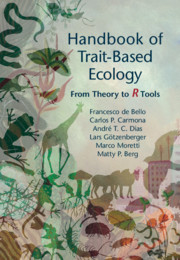Book contents
- Handbook of Trait-Based Ecology
- Handbook of Trait-Based Ecology
- Copyright page
- Epigraph
- Contents
- Preface
- 1 General Introduction
- 2 Trait Selection and Standardization
- 3 The Ecology of Differences
- 4 Response Traits and the Filtering Metaphor
- 5 Community Metrics
- 6 Intraspecific Trait Variability
- 7 Community Assembly Rules
- 8 Traits and Phylogenies
- 9 Effects of Traits on Ecosystem Processes and Services
- 10 Response and Effect Traits across Trophic Levels
- 11 Trait Sampling Strategies
- 12 Applied Trait-Based Ecology
- References
- Index
6 - Intraspecific Trait Variability
Published online by Cambridge University Press: 08 March 2021
- Handbook of Trait-Based Ecology
- Handbook of Trait-Based Ecology
- Copyright page
- Epigraph
- Contents
- Preface
- 1 General Introduction
- 2 Trait Selection and Standardization
- 3 The Ecology of Differences
- 4 Response Traits and the Filtering Metaphor
- 5 Community Metrics
- 6 Intraspecific Trait Variability
- 7 Community Assembly Rules
- 8 Traits and Phylogenies
- 9 Effects of Traits on Ecosystem Processes and Services
- 10 Response and Effect Traits across Trophic Levels
- 11 Trait Sampling Strategies
- 12 Applied Trait-Based Ecology
- References
- Index
Summary
Chapter 6 analyses the ecological mechanisms, and implications, of intraspecific trait variability (ITV) and some key approaches to take ITV properly into account in modern trait-based analyses. The different sources of ITV, genetic variation, epigenetic effects and phenotypic plasticity, are discussed and put in the context of species evolution, adaptation to environmental conditions, species distribution potential (including invasive species) and the effects of species on multiple ecosystem properties and trophic interactions. Different tools are provided to quantify how strong ITV affect ecological patterns. A comparison of within- vs between-species trait variability in a community is discussed. Tools showing how strong the effect of changes in species composition (turnover) compared to ITV along environmental gradients are provided. Finally, methods considering ITV to quantify trait differences between species, via trait overlap in trait probability distributions, are discussed in the light of modern tools measuring functional diversity across different scales
Keywords
- Type
- Chapter
- Information
- Handbook of Trait-Based EcologyFrom Theory to R Tools, pp. 105 - 128Publisher: Cambridge University PressPrint publication year: 2021



